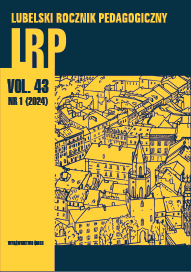SHAPING PROFESSIONAL SKILLS IN INTERCULTURAL
EXCHANGES IN THE “POLISH LANGUAGE ACROSS
BORDERS” PROJECT
SHAPING PROFESSIONAL SKILLS IN INTERCULTURAL
EXCHANGES IN THE “POLISH LANGUAGE ACROSS
BORDERS” PROJECT
Author(s): Jarosław Krajka , Małgorzata Latoch-ZielińskaSubject(s): Cultural Anthropology / Ethnology, Culture and social structure , Distance learning / e-learning
Published by: Wydawnictwo Naukowe Uniwersytetu Marii Curie-Sklodowskiej
Keywords: professional skills; intercultural competence; distance education; Polish language and culture; heritage language learning;
Summary/Abstract: Introduction: The contemporary world demands that employees in different work contexts donot only possessthe necessary professional knowledge and skills but also exhibit a necessarylevel of intercultural communicative competence that enables them to interact successfully withmultilingual and multicultural clients, peers and students. While university programmes dohave necessary arrangements for practicum, students often perceive this professional practiceas insufficient in the development of social and intercultural skills.Research Aim: The purpose of the present study was to investigate whether students of diffe-rent study programmes would find participation in the intercultural “Polish language acrossborders” project as a viable alternative to traditionally serving the practicum. Another aim ofthe research was to see how voluntary participation in an out-of-study project would contributeto the development of professional, social and communicative competencies.Method: The study followed the qualitative methodology, with the small-scale interview as adata collection procedure. The data were gathered from student coordinators of project partici-pantsthrough an online interview.Results: As was evidenced by the data on the viability of alternative forms of serving practicumcollected from student coordinators, encouraging students to volunteer in intercultural projectsdirected at foreign audiences leads to an increase in professional and intercultural competencie-sas well as results in a high level of satisfaction and motivation upon the project’s completion.The participants stressed the positive effect of participation in the project on their readiness forthe job market as well as noticed increased openness to and understanding of representativesof other cultures Conclusions: Since traditional practicum often triggers feelings of inadequacy and insufficientauthenticity among students, it is worthwhile organising non-formal education projects in theform of intercultural exchanges which would enable the acquisition of intercultural, professio-nal and communicative skills in authenticinteractions with partners from abroad.
Journal: Lubelski Rocznik Pedagogiczny
- Issue Year: 43/2024
- Issue No: 1
- Page Range: 125-141
- Page Count: 17
- Language: English

